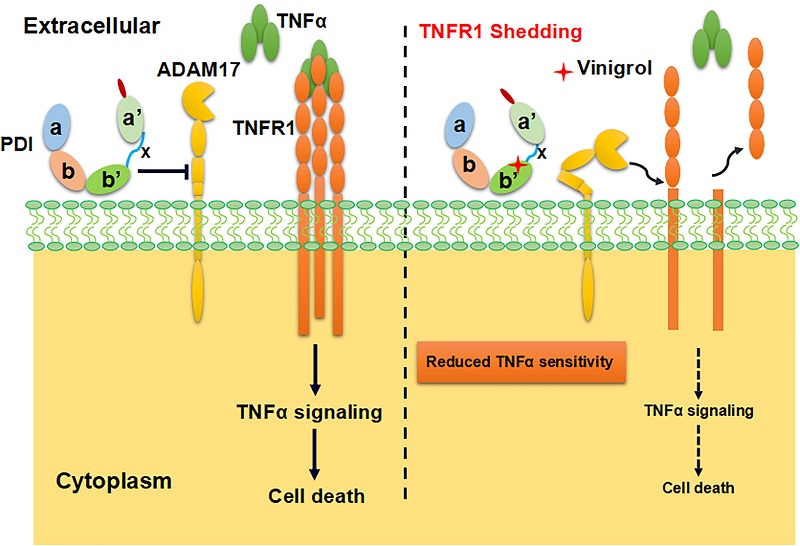The group of Prof. WANG Lei and collaborators revealed natural product vinigrol targets protein disulfide isomerase to block the inflammatory response
The natural product (-)-vinigrol has a wide range of biological activities, such as anti-hypertension, inhibiting platelet aggregation, etc. Vinigrol can antagonize tumor necrosis factor α (TNF-α) signaling. Given the central role of the signal transduction pathway mediated by TNF-α and its receptor TNFR1 in the pathogenesis of autoimmune diseases, the development of novel potent and selective small molecule inhibitors of TNF-α signaling is important for the treatment of rheumatoid arthritis.
On 31 Oct, 2023, Prof. WANG Lei’s group at the Institute of Biophysics, Chinese Academy of Science (CAS), Prof. LUO Tuoping’s group at the College of Chemistry and Molecular Engineering, Peking University, and Prof. LI Zhanguo’s group at Peking University People’s Hospital, published a research article inCell Chemical Biologyentitled “Photoaffinity Labeling Coupled with Proteomics Identify PDI-ADAM17 Module is Targeted by (-)-Vinigrol to Induce TNFR1 Shedding and Ameliorate Rheumatoid Arthritis in Mice”. This work successfully identified the direct target of vinigrol as protein disulfide isomerase (PDI) on the cell membrane, and revealed that vinigrol activates ADAM17 protease by inhibiting PDI, and then leads to the shedding of immune receptors TNFR1, thereby antagonizing the TNF-α signaling. This study demonstrates that targeting the PDI-ADAM17 signaling module to regulate the shedding of cytokine receptors is a potential strategy for the treatment of autoimmune diseases, including rheumatoid arthritis.
The research team designed and synthesized a bioactive photoaffinity small molecule probe, and combined it with activity-based protein profiling technology to find that PDI may be the protein target of vinigrol. It is worth noting that the physiological processes that PDI involved in (such as HIV invasion, platelet aggregation) are highly related to the biological activity of vinigrol. The researchers subsequently conducted target verification and mechanism studies, showing that vinigrol binds to the b' domain of PDI and inhibits its various activities including reduction, oxidation, isomerization and molecular chaperone. At the cellular level, similar to reported PDI inhibitors and PDI antibodies, vinigrol can inhibit TNF-α-induced cell death, enhance the protease activity of ADAM17 and induce the cleavage of TNFR1. Finally, in the collagen-induced rheumatoid arthritis mouse model, vinigrol can effectively reduce the arthritic score and joint damage, by inducing TNFR1 shedding (Figure 1).

Figure 1. A proposed model of the mechanism-of-action of vinigrol
Profs. WANG Lei from the Institute of Biophysics, CAS, LUO Tuoping from the College of Chemistry and Molecular Engineering, Peking University, and LI Zhanguo from Peking University People’s Hospital are the co-corresponding authors of the paper. Drs. ZHU Yinhua from Peking University, WANG Lu from the Institute of Biophysics, CAS, and LI Jing from Peking University People’s Hospital are the co-first authors.
Article link:https://www.cell.com/cell-chemical-biology/fulltext/S2451-9456(23)00339-2
Contact: WANG Lei
Institute of Biophysics, Chinese Academy of Sciences
Beijing 100101, China
Email: wanglei@ibp.ac.cn
(Reported by Prof. WANG Lei/WANG Chih-chen’s group)

